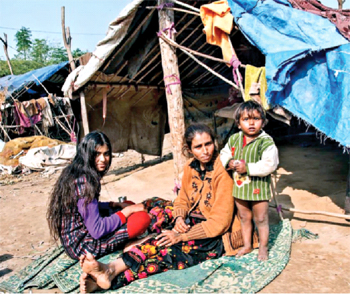Despite several affirmative actions, denotified tribes continue to suffer oppression and stigma
Phulwari (name changed) fumes when she is asked about the humiliation she had to undergo at the hands of police. A few years ago, she, along with two other women and a few men, was picked up by the police in connection with a case and illegally lodged at Sundarpahar Police Station in Jharkhand. The policemen beat up the men and women very badly. The police even stole Rs 120 from the women. They were repeatedly raped by station-in-charge Dipnarayan Mandel and another officer Mahadev Oraon. They were then paraded naked around the station. Their crime: they belonged to a particular community.
This is not an isolated case. Members of communities belonging to erstwhile ‘Criminal Tribes’ are often detained and tortured in custody by the police. Raju Singh, a resident of Barwani in Madhya Pradesh, explained how his house was ransacked and the foodgrains taken away by police who had come to arrest him in connection with a theft case. They beat up the women of the house and demanded money. Although he pleaded innocence in the case, he was badly beaten up. His family had to arrange money to get his release from the custody.
The colonial masters branded some communities as Criminal Tribes, as many of these tribes, who had lost their traditional occupations due to changes in the political and economic contexts resorted to taking up the issue with the British rulers. The colonial rulers came out with the Criminal Tribes Act in 1871. Under the Act, ethnic or social communities which were defined as “addicted to the systematic commission of non-bailable offenses” such as thefts, were systematically registered by the Government. Since they were described as ‘habitually criminals’, restrictions on their movements was also imposed, adult male members of such groups were forced to report weekly to the local police. These people faced constant surveillance, search and arrest without warrant if any member of the group was found outside the prescribed area.
At present 269 such Denotified, Nomadic and Semi-Nomadic communities are specified and a survey is now in under process to place these castes in SC, ST and BC categories. The Committee are surprised to find that the Department has not been able to take any decision till date hence they would like the Department to take necessary action in this regard so that these castes are placed either under SCs, STs or BCs and avail benefits The Parliamentary Standing Committee
After the British left the shores of India, Jawaharlal Government repealed the Act in 1949 and the erstwhile Criminal Tribes were denotified in 1952. But the Government brought in Habitual Offenders Act in the same year with not much difference
However, the legacy of the draconian law continues to haunt majority of about 10 crore people belonging to the these tribes, especially as their notification about a century ago has meant not just alienation and stereotyping by the police and the media, but also economic hardships.
Some of the communities in the denotified category are included in the list of Scheduled Castes, some others in the Scheduled Tribes, and quite a few in Other Backward Classes. But there are many of these tribes that do not find a place in any of the above.
Anil Dandekar, in an article on the condition of the Denotified Tribes (DNTs), writes: “The denotified/tribes communities have been wrongly stigmatised as crime-prone and subjected to high handed treatment as well as exploitation by the representatives of law and order as well as the general society.”
A National Commission for De-notified, Nomadic and Semi-Nomadic Tribes (NCDNT) was constituted in 2006 by the then Government. The Chairman of the Commission was Balkrishna Sidram Renke. The commission submitted its report in June 2008.
Recently, the Standing Committee on Social Justice and Empowerment, headed by BJP Lok Sabha MP Rama Devi, tabled its 31st report in Parliament. The report said the “Committee are constrained to note that the Scheme for economic empowerment of DNT communities formulated to provide coaching, health insurance, facilitate livelihood and financial assistance for construction of homes for the members of DNT, with total outlays of Rs 200 crore for the period of five years from 2021-22 to 2025-26 and the Department could not spend even a single rupee in 2021-22 and the budgetary allocation has been reduced to Rs 28 crore for 2022-23 against the budgetary allocation of Rs 50 crore for 2021-22. The Committee are dismayed that the Department has already delayed in formulation of the Scheme for welfare of Denotified, Nomadic and Semi Nomadic communities.”
The standing committee, on the functioning of the Development and Welfare Board for De-notified, Nomadic and Semi-Nomadic Communities (DWBDNC), said: “At present 269 such Denotified, Nomadic and Semi-Nomadic communities are specified and a survey is now in under process to place these castes in SC, ST and BC categories. The Committee are surprised to find that the Department has not been able to take any decision till date hence they would like the Department to take necessary action in this regard so that these castes are placed either under SCs, STs or BCs and avail benefits.”
The Government set up the DWBDNCs under the Societies Registration Act, 1860 under the aegis of Ministry of Social Justice and Empowerment for the purpose of implementing welfare programmes. The DWBDNC was constituted on February 21, 2019 under the chairmanship of Bhiku Ramji Idate. Also, a committee has been set up by the NITI Aayog to complete the process of identification of the de-notified, nomadic and semi-nomadic communities (DNCs). Ethnographic studies of DNCs are being conducted by the Anthropological Survey of India, with a budget of Rs 2.26 crore sanctioned.














Comments